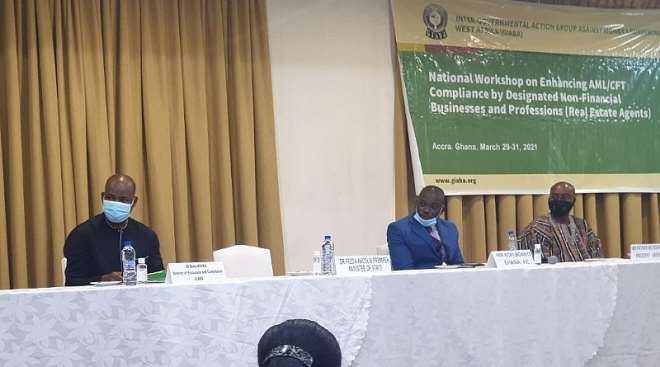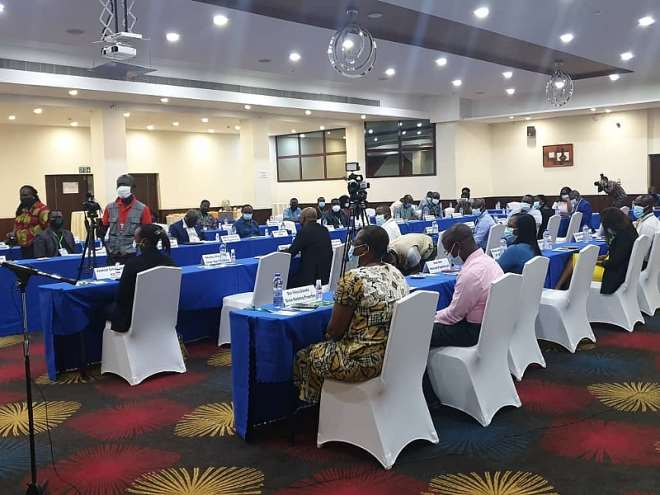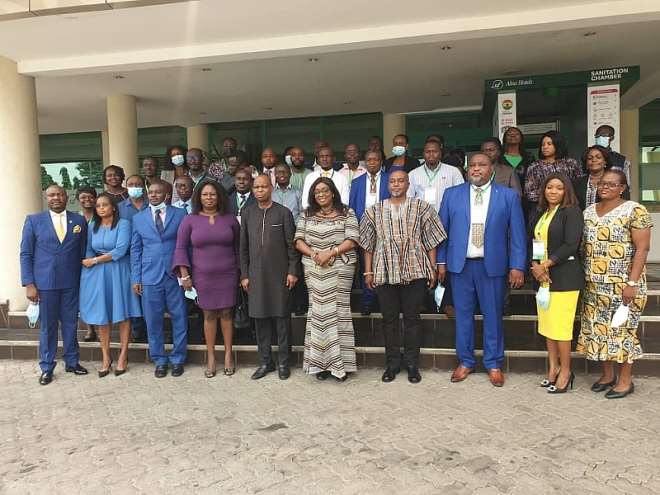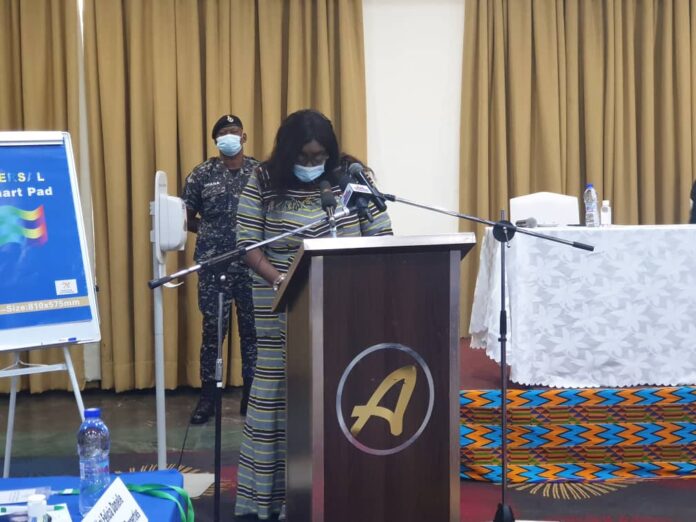Hon. Dr. Freda Akosua Prempeh, Minister of State, Ministry of Works and housing has reiterated that the Ministry of Works and Housing’s commitment to fighting against money laundering and its accompanying fraud in the Real Estate sector.
She has also reaffirmed government’s commitment to strengthening and deepening the capacity of individuals and institutions against the disguised operations of money launderers to boost Ghana’s Anti-Money Laundering and Combating the Financing of Terrorism (AML/CFT) Compliance.
She said these on behalf of the Minister of Works and Housing, Hon. Francis Asenso-Boakye at the opening ceremony of GIABA National Workshop On Enhancing Anti-Money Laundering and Combating The Financing Of Terrorism Compliance By Real Estate Agents/Practitioners, Accra.
According to her, there is a need for us to collaborate to serve as a gatekeeper to identify and keep records of beneficial owners of legal entities, trust, and other legal arrangements in real estate transactions.
Hon. Dr Freda Akosua Prempeh said the ministry in its quest to adhere to international best practices as part of the promulgation of the Real Estate Agency Act, 2020 (Act 1047) incorporated provisions to plug the avenues in which real estate transactions are used to launder money including the prohibition of the use of cash for real estate transactions.
She said this has ensured a detailed tracking of the transactions and those persons involved in the big deals of the real estate sector.
“The the Act will also strengthen the anti-corruption initiatives in the country and curbs money laundering and other financial malpractice in the sector. Also, the proposed Rent Act when completed would make provision for a tendency system that would compel landlords and property owners to conduct proper checks on tenants before renting out their properties. It is envisaged the full implementation of the new Rent Act together with the digitization of the Rent Control Department would help track the operations of both landlords and tenants within the real estate market,” the minister stated.
Notwithstanding, Hon. Dr Freda Akosua Prempeh said, having the right tools required to combat money laundering and other financial crimes is very critical.
However, it will seem pointless if industry players are not well equipped to use them because criminals are increasingly devising complex methods of committing crimes to avoid being tracked, investigated and prosecuted.
About GlABA National Workshop on Enhancing AML/CFT Compliance by Real Estate Practitioners
The Inter-Governmental Action Group against Money Laundering in West Africa (GIABA) is a specialized institution of the Economic Community of West African States (ECOWAS) as well as Financial Action Task Force-Style Regional Body (FSRB) established by the Authority of Heads of State and Government of ECOWAS in the year 2000.
The GIABA national workshop organized by GIABA Secretariat has commenced today, Monday, March 29, is expected to come to an end on Wednesday, March 31, 2021, with its main purpose of providing supervisors, self-regulatory bodies and real estate professionals with requisite knowledge on the vulnerabilities, methods and/or channels used by criminals in the real estate sector to launder money.
The workshop the also aimed at enhancing the capacity of participants on the relevant FATF standards, raising awareness of participants on current and emerging ML/TF risks; and promoting cooperation, coordination and engagement amongst and between relevant competent authorities and real sector professional on how to effectively implement AML/CFT preventive measures in Ghana.
This workshop is also expected to further strengthen national AML/CFT efforts, and improve general compliance by Ghana with relevant FATF Recommendations and Immediate Outcomes.
In his speech, Justice Kimelabalou ABA Director-General, GIABA, delivered by Dr Buno Nduka, Director of Evaluation and Compliance, said, real estate sector is one of the vulnerable sectors in which governments must channel their attention to provide financial aid towards the country’s economy.
” The real estate sector is one of the main drivers of economic growth and the engine of social stability across member States, and thus constitute an important part of economic development within the region. Nonetheless, outcomes of typologies studies by GIABA and FATF, show that real estate is one of the sectors vulnerable to money laundering and terrorist financing. This finding is re-echoed by the National Risk Assessment of the Ghana which identified the real estate sector as ever-growing and largest DNFBP, and one of the key sectors exposed to significant ML/TF risk in the country”.
According to him, the real estate sector, and all DNFBPs constitute a weak link in the implementation of AML/CFT measures in the country which has adverse implications not only on the national AML/CFT regime but regional efforts in combating money laundering and terrorist financing.
“The 2nd round of Mutual Evaluation Report (MER) of Ghana highlighted critical vulnerabilities which expose the real estate sector to ML/TF risk. In particular, the MER noted the limited understanding of ML/TF risk and AML/CFT obligations, weak due diligence, the preponderant use of cash to finance real estate transactions, the unorganized nature of the sector, operators’ ability to invest large cash and manipulate allied services and schemes, and general poor regulations and ineffective supervision and monitoring of industry players, as some of the factors that make the real estate sector attractive for the potential misuse by money launderers or terrorist financiers”, he said.
Additionally, “to support reporting institutions, including the real estate agents effectively implement AML/CFT preventive measures, GIABA has published some typologies reports, including the Typologies of Money Laundering Through the Real Estate Sector in West Africa and provided technical support/capacity building, guidance and best practices, and is currently supporting the regional association of Chief Compliance Officers to enhance engagement and coordination and foster implementation of AML/CFT regime in the region”, he stated.
Credit: Beyonce Diamond Kpogli















































